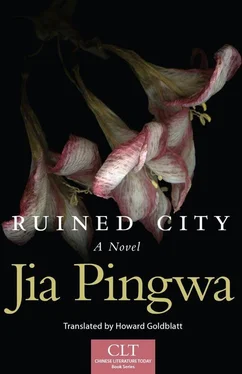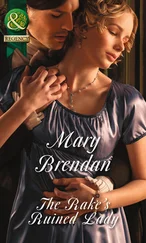“Ai-ya, it’s you, Zhuang Laoshi!” she called out shrilly. “I didn’t expect to see you here. As they say, the road turns when the mountain won’t.”
When the women inside heard her shout, Niu Yueqing pushed her tiles away. “Don’t tell him I’m here,” she said as she went into the bedroom and lowered the curtain. That was all the proof Tang needed that they really had had a fight, which elated her. She gestured to the other women with a smile and said, “Come, sit here, Zhuang Laoshi. Shimu is here. Now, where did she go?”
The others decided to go along. “When Shimu heard you were here,” one of them said, “she went inside to ‘get pretty for the one who pleases her most.’” They struggled to keep from laughing. So did Tang, who said, “Leaving already? After you heard that Shimu is here?” She walked into the yard and slammed the door shut, prompting Niu Yueqing to curse from the bedroom, “Let him go. Don’t stop him. Let him go, and he’ll never have to see me again if he doesn’t want to.” She seemed about to cry, which the other women found laughable. Xia Jie and Liu Yue went into the bedroom to drag her out.
“It’s all Wan’er’s fault. How could Zhuang Zhidie just show up like that?” Xia Jie said. “Wan’er, come, kowtow to Shimu to apologize.”
Clearly in high spirits, Tang swayed in and actually got down on her knees in front of Niu Yueqing, who could not suppress her amusement despite her anger. Pinching the girl’s lips, she said, “You little tart. You ought to go out on the street to sing ‘We are pests’; I will use 101 to kill you.”
After they had played four rounds, Meng Yunfang came in with a child, Meng Jin, the son from his previous marriage. When Meng told him to greet the aunties, the boy, without looking at the women, said, “How are you, Aunty Niu, Aunty Tang.” Then he went into his father’s study to look at some books. Xia Jie was unhappy but decided not to say anything. Meng was clearly in a good mood, and told everyone to stay for lunch, then went into the kitchen to cook. Feeling the need to be a good guest, Aunty Liu went out with five mugs to get milk for everyone. Niu Yueqing said she didn’t drink freshly squeezed milk and summoned Meng Jin, who drank it down in one gulp.
“Look how big he’s grown and how much he looks like his father,” Niu Yueqing said.
“Yunfang and I have fought over this countless times,” Xia whispered to her. “We had an agreement when we were married. The court gave the child to his ex-wife, and I didn’t mind if he wanted to care for him, but he was not to spend time in this house. He agreed, but now he brings the kid back all the time. When I mentioned it, he promised to stop doing it, but the moment I’m out, he brings him here to eat and drink whatever we have. Today he thought I’d be out and, you see, he brought him back again.”
“Well, he is, after all, Yunfang’s son. Let him bring the child here if he wants to. How much can a little boy eat?”
“It’s not how much he eats. When I divorced my first husband, the court awarded me our son, but Yunfang has never warmed to the boy, though he doesn’t treat him badly. But when he brings his son back, he showers him with love and ignores us, which makes my son feel terrible.”
Niu Yueqing did not know what to say beyond trying to make peace: “Try to be fair-minded with the two boys, and I’ll talk to Yunfang. Now that the two of you are married, both sons should be treated equally. He should not favor one over the other.”
Tang moved over when she saw them engaged in an intimate conversation, prompting them to change the subject and talk about the weather.
Liu Yue was still worried about Zhuang when they sat down to eat. “I wonder what Zhuang Laoshi is having for lunch.”
“Something good, I’m sure,” Meng said. “I ran into him on the street earlier, and he said he was going to the magazine office. He’ll either treat them to lunch or they’ll treat him.”
After lunch, Aunty Liu said her stomach was full but her cow’s was still empty, and she needed to get home. After she left, Meng played four rounds with the women before the party broke up.
. . .
As she walked home with her cow, Aunty Liu regretted having stayed so long, all for a free lunch. Her cow needed to be fed. Then there was her baby son, born outside state family planning, who was home in the care of her mother-in-law. Her breasts ached, but she could not find a secluded place to deal with that. Seeing that the front of her blouse was already wet, she found a public toilet and went in to squeeze out the milk. As she followed along behind Aunty Liu, the cow started out walking spiritedly, but before long, she lowered her head to think her many thoughts. Back when Aunty Liu was playing mahjong and having lunch, she had lain under a tree. When people who had been watching the drum procession left the area near the clock tower, vehicle and pedestrian traffic flowed like water down the lane, past the cow, which had a clear view of the people’s feet and the kinds of shoes they wore. Why have humans created high heels with pointed toes for feet that were made for walking? Why do they think that is attractive? In her view, it was cows, bears, and cranes that had pretty feet. Humans admired and were envious of the powerful beauty of a bear’s paws or the sturdy straight legs of a crane, but they did not understand that those feet were beautiful not for beauty’s sake, but for the need to survive. As she continued this line of thought, she felt pity for humans, whose standards of beauty had regressed. They do not run barefoot on sand or in brambles, but eight or nine out of ten of them have corns. Are they reaching the point where they will have to hobble along supporting themselves with their hands on a wall? In her mind, the worst developments were motor vehicles and elevators in high-rises. Everything is modernized. And look at the things they eat and the clothes they wear. And yet they lose sleep when they are bitten by a mosquito and have stomach trouble after eating a bowl of undercooked noodles. The bowls and chopsticks at food stands must be disinfected over and over; they need an umbrella when it rains and a scarf in the wind. They turn on air-conditioners in the summer and heaters in the winter. Humans are more fragile than a blade of grass. They brush their teeth every morning and night, so weakening the teeth that they avoid sour, sweet, hot, or cold food. They even use toothpicks! The most laughable, in her mind, were the so-called modern artists who displayed sculptures and murals on the street. What do they think they are doing? Nature has already provided everything out there. Can a painter create elaborate patterns to mimic the clouds? Can modern artists show the uniqueness of a wall after the rain, even the colors and images formed in a cesspool? And what is the deal with those martial arts practitioners along the city moat? Martial arts— wushu —sounds nice, but humans have turned it into a mere show with no substance. They watch TV at night. There is this thing called the Olympics, a congregation of the best athletes, who could never outrun a common gazelle in a hundred-meter dash. The Banpo people in Xijing were the ancestors of humans, the real humans. They might not have been able to run as fast as those athletes, but they were certainly better at combat. Humans have regressed to the point that they pale in comparison even to the Qin terracotta soldiers — shorter in height, with thinner waists. But humans want to look trim, so there are waist tightening belts and pants for sale, even slimming creams and tea. They have a clever brain, but that brain is precisely the cause of their regression. The cow finally realized what a city really was: a place where regressed humans congregate after they can no longer adapt to nature and the universe, when they are afraid of the wind, the sun, the cold, and the heat. If a human were put on a vast prairie or on a high mountain cliff, he would not be the equal of a rabbit, even a ladybug. The cow’s head hung even lower at these thoughts, and she heard a passerby say:
Читать дальше


![Matthew Vincent - [you] Ruined It for Everyone!](/books/216429/matthew-vincent-you-ruined-it-for-everyone-thumb.webp)









